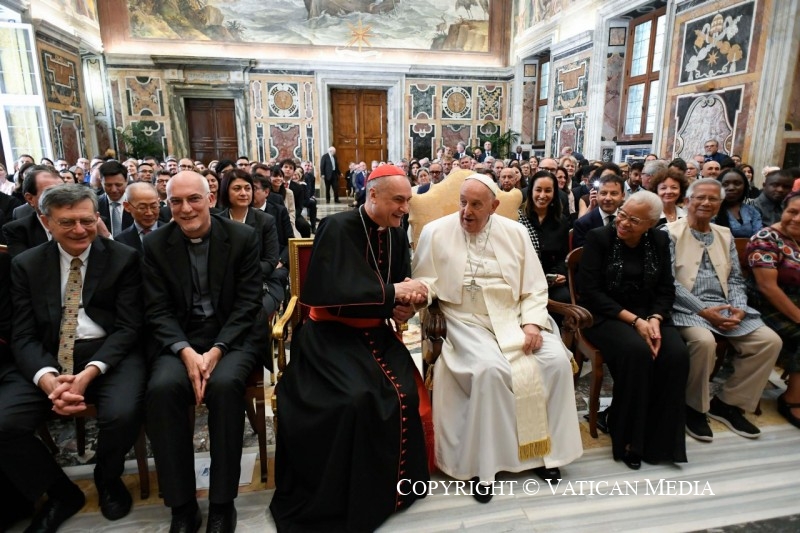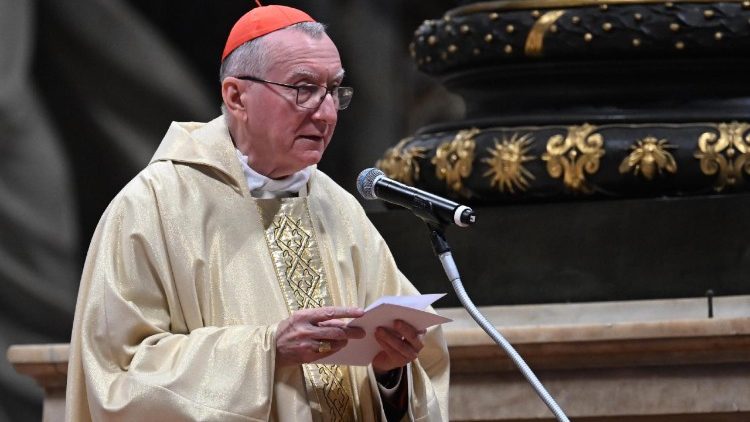“We have not yet learned the simple art of living together as brothers”
Pope's speech to participants in the event “World Meeting on Human Fraternity”

This morning, in the Vatican Apostolic Palace, the Holy Father Francis received in the audience the participants in the World Meeting on Human Fraternity organized by the Fratelli Tutti Foundation.
Francis expresses his concern for the “planet on fire” and indicates the need to reach “peace of hearts so that people can find themselves in the confidence that life always conquers all forms of death.”
Below, we publish the speech that the Pope addressed to those present at the meeting:
***
Holy Father’s speech
Dear brothers and sisters, good morning!
Welcome! Thank you for being here, from many parts of the world, for the World Meeting on Human Fraternity. I thank the Fratelli tutti Foundation, which has proposed to promote the principles set out in the Encyclical, “in order to encourage initiatives linked to spirituality, art, education and dialogue with the world, around Saint Peter’s Basilica and in the embrace of its colonnade” (Chirograph, i8 December 2021).
In a planet in flames, you have gathered with the intention of reiterating your “no” to war and “yes” to peace, bearing witness to the humanity that unites us and makes us recognize each other as brothers and sisters, in the reciprocal gift of the respective cultural differences.
In this regard, I am reminded of the words of a famous speech of Martin Luther King, when he said: “We’ve learned to fly the air like birds, we’ve learned to swim the seas like fish, and yet we haven’t learned to walk the earth as brothers and sisters” (Martin Luther King, Speech on the occasion of the award of the Nobel Peace Prize, 11 December 1964). That is indeed the case. And so, let us ask ourselves: how can we, concretely, return to the art of living together as truly human beings?
I would like to return to the key attitude proposed in Fratelli tutti: compassion. In the Gospel of Luke (cf. 10:25-37), Jesus tells of a Samaritan who, moved by compassion, approaches a Jew who has been left half-dead at the roadside. Let us look at these two men. Their cultures were enemies, their histories diverse and conflictual, but one becomes a brother to the other at the moment when he lets himself be guided by the compassion he feels for him – we might say, he lets himself be attracted by Jesus present in that wounded man. As one poet has Saint Francis of Assisi say in one of his works: ‘The Lord is where your brothers are’ (É. Leclerc, The Wisdom of a Poor Man).
In the afternoon you will meet at twelve points in Vatican City and Rome, to express your intention to generate a movement of outgoing fraternity. In this context, the working “tables”, which have been prepared over recent months, will present some proposals to civil society, focused on the dignity of the human person, in order to construct good policies based on the principle of fraternity, which “enhances freedom and equality” (Fratelli tutti, 103). I have appreciated this decision, and I encourage you to go ahead in your work of silently sowing. This can give rise to a “Charter of the Human” – “Charter of the Human” – which includes, together with rights, also the behaviour and practical reasons for what makes us more humane in life.
And I invite you not to be discouraged, because “persistent and courageous dialogue does not make headlines, but quietly helps the world to live much better than we imagine” (ivi., 198).
In particular, I wish to thank the group of distinguished Nobel Laureates present, both the for the Declaration on Human Fraternity, drafted on 10 June last year, and for the commitment you have made this year to reconstruct a “grammar of humanity”, a “grammar of the human”, on which to base choices and behaviour. I urge you to move forward, to make this spirituality of fraternity grow, and to promote, through your diplomatic action, the role of multilateral bodies.
Dear brothers and sisters, war is a deception. War is always a defeat, as is the idea of international security based on the deterrent of fear. It is another deception. To guarantee lasting peace, we must return to a recognition of our common humanity and place fraternity at the centre of peoples’ lives. Only in this way will we succeed in developing a model of coexistence capable of giving the human family a future. Political peace needs peace of hearts, so that people can meet in the confidence that life always triumphs over all forms of death.
Dear friends, in greeting you I think of the embrace that this evening, like last year, will be achieved by so many young people. Let us look at them, let us learn from them, as the Gospel teaches us: “unless you turn and become like children, you will never enter the kingdom of heaven” (Mt 18:3). Let us all make this embrace a commitment of life and a prophetic gesture of charity.
Thank you for what you do! I am close to you and I ask you to pray for me.
And now, all together, in silence, let us ask for and receive God’s blessing.
____________________________________
Holy See Press Office Bulletin, 11 May 2024
Related

Francis is gradually improving: signs of recovery at the Vatican
Exaudi Staff
04 April, 2025
1 min

John Paul II: The Tireless Pilgrim Who Continues to Inspire the World
Exaudi Staff
03 April, 2025
2 min

Pope Francis and Hope: Reflection on Jesus’ Encounter with Zacchaeus
Exaudi Staff
02 April, 2025
2 min

Technology with a Human Face: Pope Francis’ Call for Ethical and Caring Use
Exaudi Staff
01 April, 2025
1 min
 (EN)
(EN)
 (ES)
(ES)
 (IT)
(IT)

